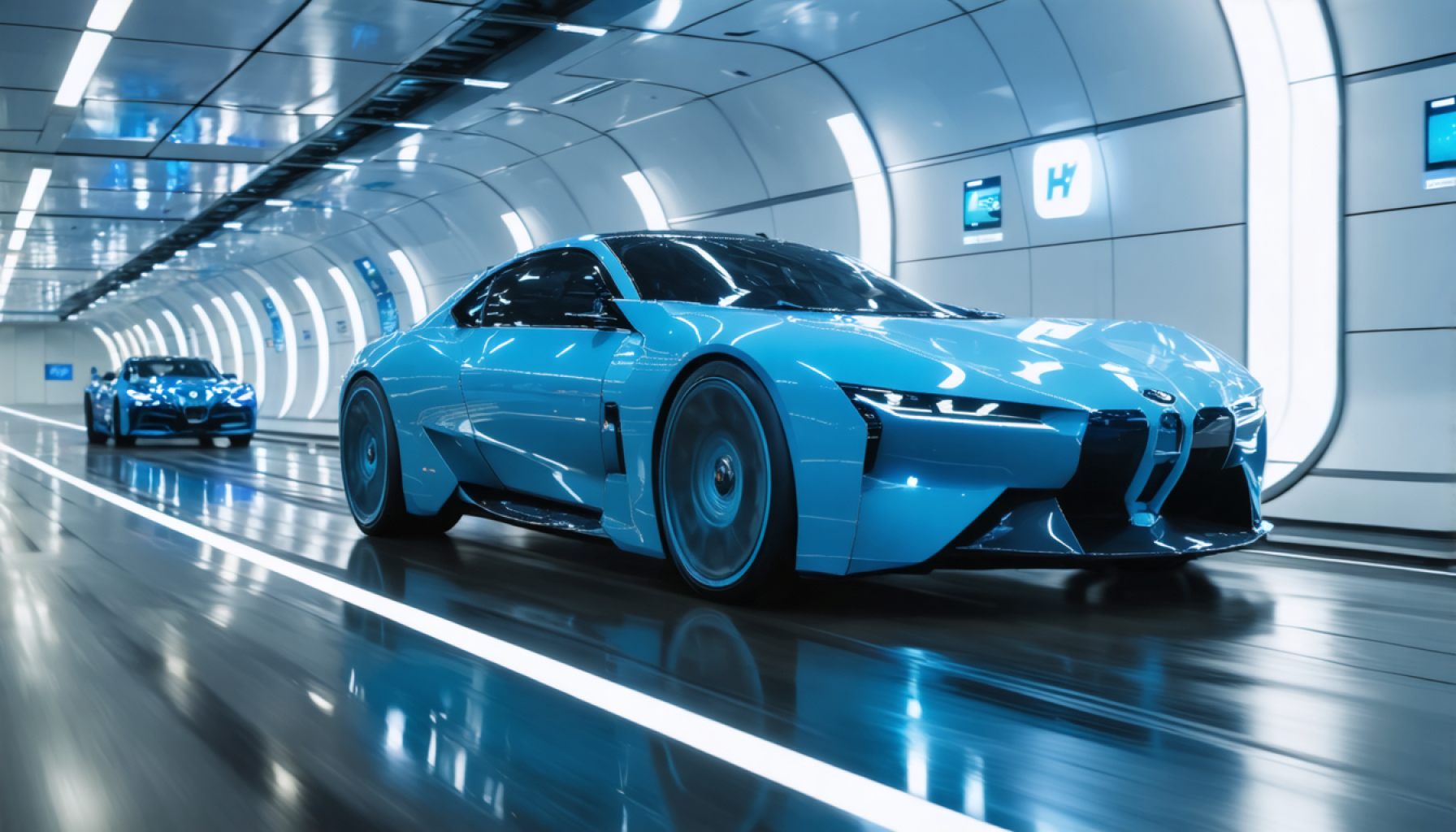- Toyota and BMW are advancing hydrogen fuel cell technology, diverging from the electric battery focus of many automakers.
- The partnership aims to introduce a hydrogen-powered version of the BMW X5 by 2027 or 2028, using Toyota’s 3rd Generation Fuel Cell System.
- The new fuel cell system offers a 20% increase in range and double the durability, with a compact, cost-effective design.
- Key challenge: limited hydrogen infrastructure, especially in North America, though plans exist to expand networks for various transport modes.
- The collaboration suggests a future automotive market featuring choices between electric and hydrogen-powered vehicles.
- Success in this venture could transform hydrogen into a cornerstone of sustainable transportation, reshaping automotive expectations.
Daring to blaze a trail where others retreat, Toyota and BMW are charting a bold new course with their commitment to hydrogen fuel cell technology. While many automakers pivot sharply toward electric batteries, these industry giants are doubling down on hydrogen, aiming to redefine the landscape of sustainable transportation.
Toyota recently unveiled its 3rd Generation Fuel Cell System, promising a stronger, more efficient, and notably cheaper solution. BMW, a longtime explorer of hydrogen technology since 1979, is set to leverage this innovation. Their collaboration foresees a future where the next-generation X5 might finally offer a hydrogen-powered model by 2027 or 2028, blending cutting-edge hydrogen cells into a vehicle that whispers of tomorrow.
This partnership could revolutionize hydrogen’s role in the auto industry. The enhanced fuel cell system boasts a remarkable 20% increase in range and doubles the durability, wrapped in a compact, cost-effective design. Imagine the silky power of the X5 gliding with the energy of a future unwritten but tangibly close.
Yet, the journey is not without hurdles. Critics point to a glaring lack of hydrogen infrastructure, noting the sparse refueling options, especially across North America. But Toyota and BMW see a different horizon—one where expanding networks cater not just to cars but to heavy-duty trucks, trains, and even ships.
Their bold gamble hints at a more diverse automotive ecosystem. Picture a market where consumers choose between fully electric or hydrogen-powered X5s—a spectral lineup primed to shift our interaction with vehicles.
In the end, this venture signals more than innovation; it embodies a shared vision. If executed, it could reshape our expectations and fuel a broader acceptance of hydrogen as a legitimate pillar in the drive toward sustainability. As 2027 beckons, the road ahead looks charged with possibility—a testament to the power of daring to see beyond the obvious.
The Hydrogen Revolution in Cars: Will Toyota and BMW’s Bet Pay Off?
Breaking Down the Hydrogen Car Revolution by Toyota and BMW
How-To Steps & Life Hacks
Hydrogen cars operate differently from traditional vehicles. Here’s how to maximize performance from your hydrogen-powered vehicle:
1. Understand the Technology: A hydrogen fuel cell vehicle (FCV) uses hydrogen gas stored in a tank. The hydrogen reacts with oxygen from the air to produce electricity that powers the electric motor.
2. Locate Refueling Stations: Use apps or online resources dedicated to locating hydrogen refueling stations. As the infrastructure develops, stay informed about new openings near your area.
3. Maintenance Tips: Hydrogen vehicles generally require lower maintenance due to fewer moving parts. However, regular check-ups for the fuel cell system are recommended.
4. Driving Efficiency: Just like any electric vehicle, smooth acceleration and steady speeds can improve fuel economy in hydrogen cars.
Real-World Use Cases
Hydrogen fuel cells show promise beyond personal vehicles:
– Public Transit: Cities like Los Angeles have begun integrating hydrogen fuel cell buses into public transportation.
– Heavy-Duty Transport: Companies are exploring hydrogen-powered trucks as a sustainable solution for long-haul freight.
– Maritime and Rail: Hydrogen cells are being tested for use in trains and ships, potentially reducing carbon footprints in these sectors.
Market Forecasts & Industry Trends
According to a report by Allied Market Research, the global hydrogen fuel cell vehicle market is expected to reach USD 42 billion by 2030, growing at a compound annual growth rate (CAGR) of 66.9%.
– Growing Infrastructure: Countries like Japan, Germany, and South Korea are investing heavily in hydrogen infrastructure to support increased adoption.
– Technological Innovations: Advancements in hydrogen production and storage are making fuel cells more viable.
Reviews & Comparisons
While battery electric vehicles (BEVs) are currently more prevalent, FCVs offer distinct advantages:
– Refueling Speed: Hydrogen cars refuel in minutes compared to the hours needed for charging BEVs.
– Range: Hydrogen vehicles often offer longer ranges similar to gasoline cars, overcoming one of the BEVs’ limitations.
Controversies & Limitations
Critics of hydrogen fuel cell technology argue that:
– Lack of Infrastructure: The current scarcity of refueling stations poses a significant barrier.
– Cost of Production: Producing hydrogen can be energy-intensive and costly. Green hydrogen, made from renewable resources, remains a small fraction of total production.
Features, Specs & Pricing
– Toyota’s 3rd Generation Fuel Cell System: This promises greater efficiency and reduced costs.
– BMW Hydrogen-Powered X5: Expected around 2027, featuring cutting-edge fuel cell technology.
– Estimated Pricing: Although not officially announced, hydrogen cars currently range between $50,000 to $60,000.
Security & Sustainability
Hydrogen fuel is non-toxic and when derived from renewable sources, offers a sustainable, eco-friendly alternative. However, safety measures must be in place during refilling to manage the pressurized hydrogen gas.
Pros & Cons Overview
Pros:
– Quick refueling time.
– Long driving range.
– Reduced emissions when using green hydrogen.
Cons:
– Sparse refueling infrastructure.
– High initial costs.
– Energy-intensive hydrogen production process.
Actionable Recommendations
– If considering a hydrogen vehicle, stay informed about local infrastructure development.
– Educate yourself on the benefits and requirements of owning an FCV.
– Monitor emerging technologies and market trends to make informed decisions.
Related Resources
For more information about hydrogen cars and other sustainable technologies, visit the official websites of Toyota and BMW.
Unlock a new era in transportation with informed choices and early adoption of sustainable technology.


